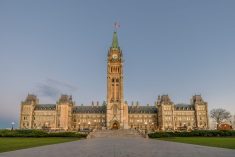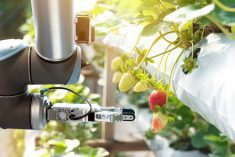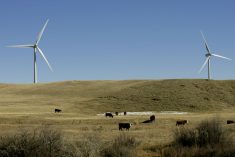Ottawa — Detailed plans of the federal government’s food buyback program are expected soon, according to Agriculture Minister Marie-Claude Bibeau.
Ottawa tabbed $50 million of its COVID-19 response funds for agriculture to buy surplus food from farmers and redistribute it to communities in need.
The challenge Bibeau and her federal colleagues are faced with is how to match excess food supplies with pre-existing food security distribution networks.
“It’s a matter of days before we inform everyone of the criteria of the programs, but we have already started to work with the different industries who have surpluses that they can offer to the food-bank networks,” Bibeau said during a media availability Tuesday.
Read Also

U.S. grains: Wheat futures rise on supply snags in top-exporter Russia
U.S. wheat futures closed higher on Thursday on concerns over the limited availability of supplies for export in Russia, analysts said.
Initial indications from the federal government were that the money would start rolling out by the end of May, when the fund was first announced.
But Canada’s food supply chains are not straightforward enough to simply take excess products, such as potatoes and poultry, and distribute them to food banks.
In an online meeting of the Commons standing agriculture committee on Wednesday, Bibeau said some concerned sectors, including meat, horticulture and fish producers, have been contacted already.
According to a statement from Agriculture and Agri-Food Canada (AAFC), commodities that would be eligible for the program are still being identified, and the program parameters are being developed to be made public “in the near future.”
“This will be done in a manner that respects the needs and health of vulnerable populations in Canada, fairly compensates agricultural producers and agri-food processors, maintains positive relationships with community food providers, and supports efforts to reduce food waste,” the statement said.
Bibeau also hinted the federal government’s “Buy Canadian” promotional campaign will “have to wait a bit longer” before being launched.
Concerns have been raised within her department over the timing of that program, and what commodities it will focus on, but its goal remains to spend $25 million to “build consumer confidence and pride in Canada’s agriculture, food and seafood producers and highlight the advantages of their products.”
Bibeau’s comments came during a press conference to announce previously announced money was available to help address food security issues. To support local food infrastructures, roughly $43.4 million can now be accessed by eligible organizations.
— D.C. Fraser reports for Glacier FarmMedia from Ottawa.















